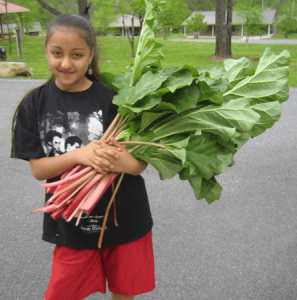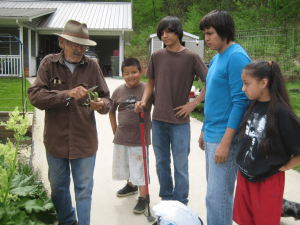The Cherokee Extension program has been serving the Eastern Band of Cherokee Indians for more than 25 years in the mountains of Western North Carolina, just south of Great Smoky Mountains National Park
Activities
North Carolina Cooperative Extension is an educational partnership helping people put research-based knowledge to work for economic prosperity, environmental stewardship, and improved quality of life. Extension’s goals are to:
- Enhance agriculture, forest, and food systems
- Develop responsible youth
- Strengthen and sustain families
- Conserve and improve the environment and natural resources
- Build quality communities
- Preserve and protect Cherokee culture
Highlights
MEASURING IMPACT
-
“Well, you couldn’t [garden] without Extension, because they are the ones that organize all the events. I’m sure that they got the feedback about the [traditional vegetable]. So, you can’t just go buy [traditional vegetable] in bulk. So, [Extension is the] connection between the farmers and gardeners, and they’re the connection between the [tribal] population and all the events that go on, from the programs, from 4-H, to the seed giveaway, to plants, to giving you information on anything that you may want to start as a farming venture.”
-
“… there’s 100 counties in North Carolina and we’re 101st and if we didn’t have a FRTEP agent being able to go out and assist all these outlying areas… I think that’s the really important part, because we are spread all over the traditional homelands.”
FRTEP programs have had a major impact on individuals, families and tribal communities. Just how much impact has now been quantified thanks to a research project that used Ripple Effects Mapping (REM) and content analysis. The Indian Land Tenure Foundation (ILTF) engaged in a joint collaboration with an evaluation team and the Western Extension Risk Management Education Center to measure the long-term impacts of the Federally Recognized Tribal Extension Program (FRTEP) serving the Eastern Band of Cherokee Indians. Click the link below to read the report.
Youth Forestry Program
The Extension Forestry Youth program offers a variety of wildlife projects for kids. The projects use inquiry-based learning strategies to develop important life skills, including critical thinking, wise use of resources, and communication. The wildlife projects also help youth achieve several objectives:
- Help youth understand how our wildlife species fit together in a natural environment
- Increase knowledge of how wildlife can be managed
- Gain appreciation of intrinsic, environmental and economic value of wildlife resources
- Raise insight regarding wildlife-human interactions
The projects are divided into groups by age (9-12 and 13-15) and can be led by 4-H volunteer leaders, youth, extension agents, educators and parents who have an interest in learning and teaching about wildlife.

Farming and Gardening
Cherokee FRTEP provides technical assistance to farmers and gardeners. An annual garden contest draws large numbers of entries each year. A large number of garden kits and apple trees have been distributed in the community as part of the Chief’s Cherokee Family Garden Project to promote traditional family gardening. Various groups have formed, including those with interests in beekeeping and the study of plants. Field days and on-farm demonstrations are held on two tribal farms.
The Cherokee were the original agriculturalists of the region, and have been growing food in the mountains of North Carolina for 6,000 years. Seeds and plants are significant to the Cherokee culture, and every seed and plant has a story that makes it culturally relevant.
Led by the Center for Cherokee Plants, a major effort has been made to preserve and share sacred plants. The goal is to reintroduce cultural foods to the people by sharing the seeds and giving Tribal members the skills to grow their own food. The Center has an extensive youth gardening program and uses a mobile classroom around the state to deliver workshops on gardening, health and the cultural history of Cherokee plants and foods. As a result, more than 700 youth have received gardening kits each year, about 6,000 in all, and the number of gardens in the community has increased by more than 70 percent.

Contact Information
Ronald Walker – Program Director
Phone Number
828-359-6930
chumwalk@nc-cherokee.com